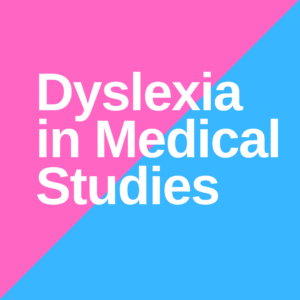 Dyslexics can work in a wide variety of professions, as we have reported here several times. This also applies to the medical field. It is not yet known how many medical professionals are affected by Dyslexia. However, we have seen dyslexics studying human or veterinary medicine or already working in their field on several occasions.
Dyslexics can work in a wide variety of professions, as we have reported here several times. This also applies to the medical field. It is not yet known how many medical professionals are affected by Dyslexia. However, we have seen dyslexics studying human or veterinary medicine or already working in their field on several occasions.
Intellectually (in terms of knowledge), studying medicine is not a problem for most of those affected. However, in these fields, the subject of Dyslexia is not discussed at all or rarely, and people come out even less often than in other fields of study. The barriers for dyslexics seem to be much lower in fields such as social work, architecture, and other engineering professions. In contrast, in elite fields of study such as medicine, psychology, and law, there is a greater stigma to coming out as dyslexic. This often triggers anxiety or self-doubt among those affected when choosing a course of study, even though these students often perform very well academically when guided and supported according to their abilities.
Many of those who are affected encounter a lack of understanding. Professors or colleagues doubt their professional suitability by pointing out that they cannot read and write without errors. This results in strong pressure to perform, which can affect the overall psychological state of the students. Those affected deal with this pressure in very different ways, with family background and the school development that they experienced playing an important role.
Some dyslexics are confronted with sentences like „How can you choose such a profession with these problems? That’s just won’t work!“. This is what some affected medical students experience in their everyday life. Often the good abilities of those affected are not recognized, because until today it is assumed that Dyslexia is a disease or disability. The fact that Dyslexia is listed as a reading and spelling disorder in the ICD-10 manual is also controversial among medical trainees. Many medical professionals view this particular reading-spelling disability as a mental illness. Therefore, it is a major handicap for many dyslexics to dealing openly with the problem. In this way, those affected are prevented from better professional development. With a more pragmatic approach, they could be better integrated, by recognizing and promoting their personal and professional potential regardless of their writing skills.
Dyslexics do not infrequently choose medicine as a field of study. This may be related to their usually good knowledge of science. They are also often very social and compassionate. Therefore, they are well suited for these professions, provided they are academically capable.
It would be good if the departments were more enlightened in regard to their approach of this topic. In addition, the medical condition of Dyslexia as a reading and spelling disorder should be questioned. For those affected, it often means discrimination instead of the necessary integration into working life.
Education politics should pay more attention to this issue. Otherwise, we will continue to miss many good opportunities to use the good potential of dyslexic people.

